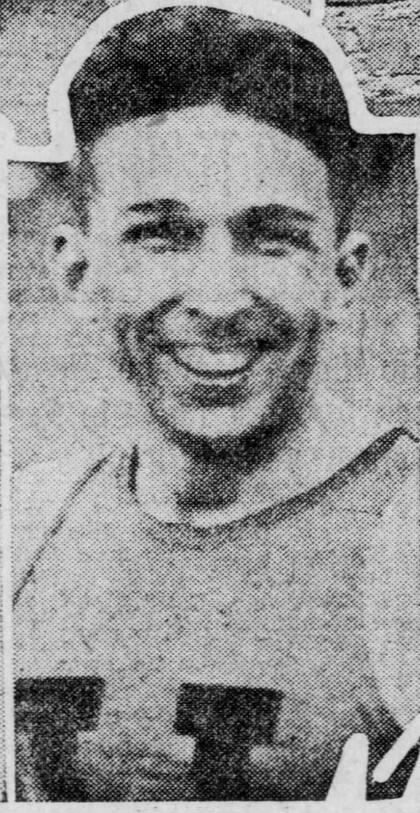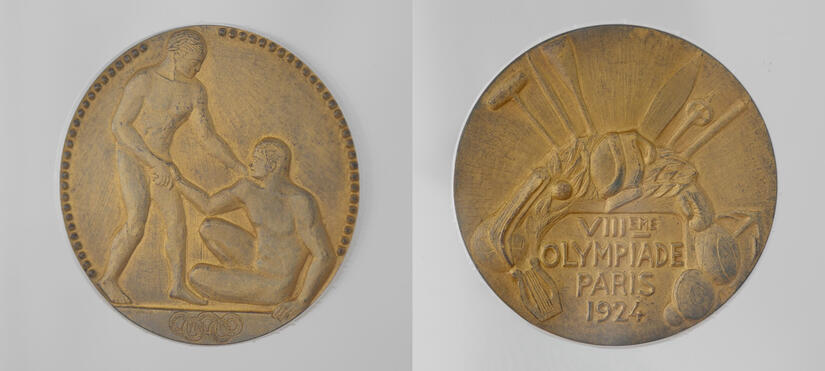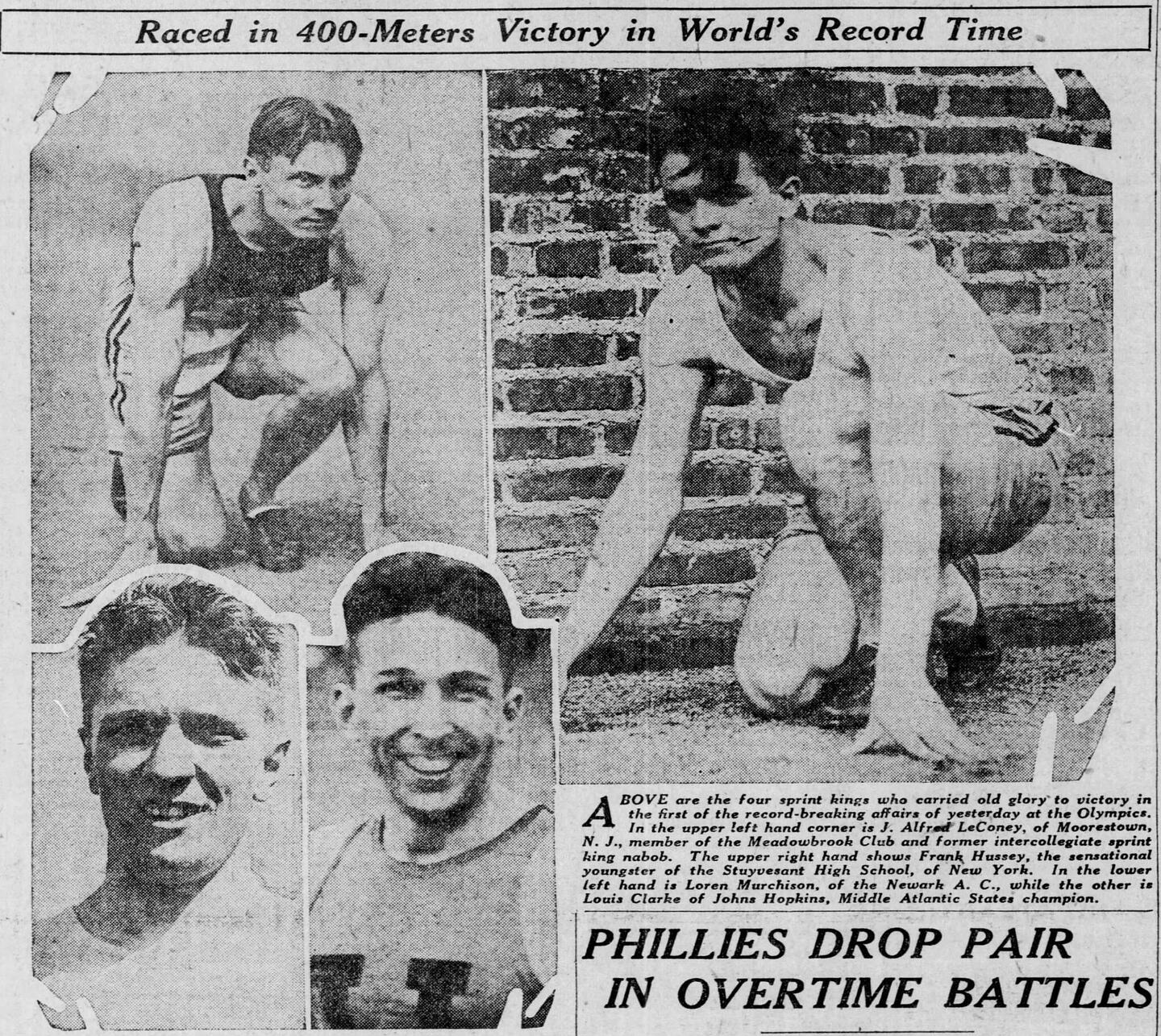This summer's Paris Olympics have given the U.S. plenty to cheer about, including gold-medal moments from household names like gymnastics phenom Simone Biles, who now has seven Olympic golds and counting, and swimmer Katie Ledecky, now the most medaled American woman in history with 14.

Image caption: Louis Clarke
Image credit: The Philadelphia Inquirer
But did you know that a Johns Hopkins alum also captured Olympic gold in Paris? Louis Alfred Clarke, who honed his track and field prowess at Homewood Field, medaled as part of the winning four-man team in the 4x100-meter relay. The press dubbed him the "Johns Hopkins Speed Merchant" and the "100-yard hurricane." If the name is new to you, it's because his Paris Olympics was 100 years ago in 1924.
Clarke, who earned a chemistry BA in 1922 and did two years of graduate study in the field, didn't seriously start running until his sophomore year at Hopkins. He went on to set a couple of world records and was a shoo-in member of the inaugural class of the JHU Athletic Hall of Fame.
One person who proudly remembers this veteran speedster is his granddaughter, Dawna Clarke.
"Growing up, I was always aware that he was a gold medalist, although he was pretty humble and didn't talk very much about it," Clarke says over the phone from a Maine vacation house. As a girl, she recalls exploring a brimming box of dusty track and field medals he had in the attic—though the Olympic medal wasn't among them; for many years now, it has been framed and hanging on her parent's wall.
Louis Clarke's entry in the 1922 Hopkins yearbook describes his improbable origins as a track star. He was born in Statesville, North Carolina, but had lived in Baltimore since age 12. He came to Hopkins in 1919 an aspiring baseball player. However, his prowess on the diamond was "not very successful" the yearbook says. He attracted attention "chiefly by his speed on the bases." This led someone to suggest Clarke enter an upcoming inter-class track meet and "merely as a matter of class spirit he donned a track suit and ventured forth." Turns out he didn't need bases to fire up his fleet feet. He bested the top varsity runners in the 100-yard dash and the 220. Clarke hung up his baseball glove and hit the track.

Image caption: Images of the gold medal won by Louis Clarke at the 1924 Olympics in Paris.
Image credit: Courtesy Dawna Clarke
Clarke was soon a top collegiate runner. He took first place in a 1923 NCAA track meet for the 100-yard dash. At an indoor meet in Baltimore's Fifth Regiment Armory in February 1924, he dashed that same distance in 9.80 seconds, then a world indoor record. Soon it was time to pack for Paris. "His Olympic coach was a man by the name of Lawson Robertson, who also went on to coach Jesse Owens in the 1936 Olympics," Clarke says. Why the celebrated sprinter didn't compete in the 100-meter event (no yards in France) is a bit of a mystery. "One story we've heard was that he got food poisoning," Clarke says.
The "Hopkins Speed Merchant" was the second runner in the 4x100 relay, taking the baton from Frank Husey and handing it to Loren Murchison (also a gold medalist in the event in 1920), with Jeremiah Alfred LeConey running the anchor leg. The U.S. team set two world records in Paris—the clocked in at 41.2 seconds in their qualifying heat, besting the previous mark of 42.2 seconds. They bettered that in the final with their gold-medal time of 41 seconds flat. The British team that finished two-tenths of second later to win silver included runner and long jumper Harold Abrahams, who took gold in the 100m in Paris and whose track exploits are depicted in the Oscar-winning 1981 film Chariots of Fire (think slow-motion runners and a Vangelis soundtrack).

Image caption: This 1924 newspaper clipping from The Philadelphia Inquirer shows the winning American 4x100m relay team from the Paris Olympics: clockwise from the top left, J. Alfred LeConey, Frank Hussey, Louis Clarke, and Loren Murchison.
Image credit: The Philadelphia Inquirer
Turns out, Clarke isn't the only Hopkins athlete to medal 100 years ago. Long-distance runner Verne Booth, who earned his geology BA in 1924, collected a silver medal as part of the U.S. cross-country team that same year.
As for Clarke, he continued to compete for a few more years and then settled into a long, fruitful career as a chemist for the Texaco oil company, where he was awarded numerous patents. He died in 1977 at age 75.
A century after he made his mark in Paris, the Olympic torch burns there again. And Dawna Clarke plans to be on hand, making the trek with her son and his fiancée. They already have tickets to the 4x100 relay, the final of which is scheduled to be run on Friday. American Noah Lyles, who won gold in the men's 100m on Sunday, is expected to be part of the U.S. relay team.
Runners have gotten significantly swifter since 1924, as the current Olympic record in this event (held by a Jamaican team which included Usain Bolt), is more than 4 seconds faster than Clarke's time. None of which matters much to Dawna Clarke, who just wants to witness it all.
"I think it's just such a wonderful way to honor my grandfather," she says. "We're big fans of the Olympics and I've never been to one. That we can go a hundred years later and celebrate him is going to be a trip of a lifetime."






